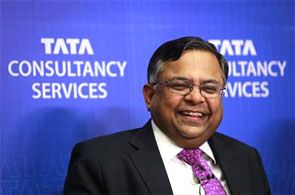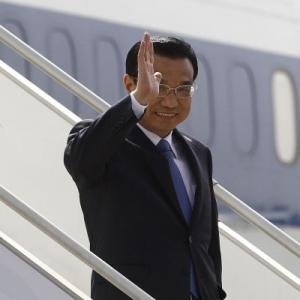Chinese premier's visit recognises the Tata firms progress in his country but theres still much to be sober about.
When Chinese Premier Li Keqiang comes to Mumbai on Tuesday afternoon, his first stop will be the offshore development centre of India's largest information technology company, Tata Consultancy Services, in the western suburbs.
In attendance will be Tata Group chairman Cyrus Mistry, TCS managing director & chief executive R Chandrasekaran and some of his counterparts in other companies of the conglomerate. Details of the visit are being kept secret, presumably due to security issues; TCS executives are only willing to say there will be a photo-op, the presence of sundry TV cameras, for public consumption.
 The reason for the premiers visit to TCS is obvious. It was the first Indian IT company to enter that country, through a joint venture in Shanghai in 2002. Other IT companies followed but their record has been muted. The Tata firm has emerged the largest Indian software business company there, servicing large Chinese state-run companies, mainly the banking sector via the cloud-enabled TCS BaNCS. Four major Chinese banks, including Bank of China and Hua Xia Bank, have been clients for years.
The reason for the premiers visit to TCS is obvious. It was the first Indian IT company to enter that country, through a joint venture in Shanghai in 2002. Other IT companies followed but their record has been muted. The Tata firm has emerged the largest Indian software business company there, servicing large Chinese state-run companies, mainly the banking sector via the cloud-enabled TCS BaNCS. Four major Chinese banks, including Bank of China and Hua Xia Bank, have been clients for years.
TCS has also made major investments in developing local market capabilities in China and has six Global Delivery Centers in the country Beijing, Hangzhou, Shanghai, Shenzhen, Tianjin and Dalian. Last year, TCS China was listed among the 2012 Top 10 Global Service Providers in China by the China Council for International Investment Promotion.
TCS executives say there is a lot of opportunity in technologies such as cloud, mobility and big data, as Chinese corporations are spending money on improving workflow, migrating data to remote computers and allowing remote access to information.
The company's crowning glory is the iCity or the Intelligent City, utilising smart technologies and collective intelligence to improve a citys livability and sustainability. These cities will be built on cloud infrastructure that makes them easy to run. Every citizen will own a personalised information page for health records and blood pressure measurements, beside getting health alerts and doctors advice. While a trial project is on at Guangzhou, the third largest Chinese city, more blueprints are on the drawing boards in first-tier and second-tier Chinese cities, including Tianjin, Ningbo and Chengdu.
These smart achievements in the world's second largest economy have been great but analysts say its not roses all the way. Even after 10 years of operations, the China business of TCS is less than $100 million (Rs 540 crore) and the size of its workforce a little over 2,500. For an over $10-billion company, thats peanuts. Unless you are at least a half a billion dollar business, you just can't make your presence felt in that country, an analyst said.
For comparison, look at Latin America. In roughly the same timeframe, TCS has recruited over 10,000 people and the revenue is many times that in China.
Experts say all this reflects the fact that China is an extremely difficult market to crack. Major vendors all over the world have met obstacles localising their products and securing distribution channels. One major problem for foreign companies is that much smaller local rivals often undercut prices, Companies like TCS find it difficult to operate on such a low cost base and find it difficult to scale up, said an observer, adding the market is too fragmented for a large-scale centralised system of operating.
Building local distribution channels has been another obstacle for foreign vendors. Local Chinese companies are so small that its difficult to partner them. For example, one of the biggest Chinese vendors in the IT space has only 12,000 people,
Despite these problems, analysts say China remains too big a potential market to ignore. Research agency Gartner estimates China's overall IT spending will expand by eight per cent a year, to $172.4 billion by 2016, largely on consumer electronics and cloud software, while growth elsewhere hovers around three per cent yearly. According to a survey by accountancy firm KPMG, China's total outsourcing market will grow to $43.9 bn by 2014, more than double its $20 bn in 2009. Thats the kind of market that Indian IT companies such as TCS are positioned to seize.
The trust factor is very important to stay on and prosper in China. TCS has been able to earn that in the last 10 years, though its operations have remained small-scale. The time for take-off is now, says an analyst. One reflection is that TCS is planning to more than triple its work force in China in the next three years.










